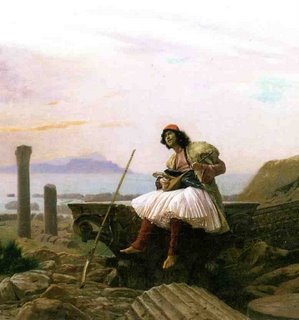Χαίρε, Ώ Χαίρε, Ελευθεριά
That’s “Freedom, I greet you,” the last line of the first verse of the Greek national anthem, penned by the great modern Greek poet Dionysios Solomos (1798-1857). Anyone who’s ever watched an Olympic opening ceremony has heard the Greek national anthem, though I suspect few would recognize it.
Σέ γνορίζω από τήν κόψη
του σπαθιού τήν τρομερή,
σέ γνορίζω από τήν όψη
πού μέ βία μετράει τή γή.
Απ’ τά κόκκαλα βγαλμένη
τών Ελλήνων τά ιερά,
καί σάν πρώτα ανδρειωμένη
χαίρε, ώ χαίρε, Ελευθεριά!
I know you by the fierce edge of your sword;
I know you by the look that measures the earth.
Freedom, who sprang forth from the sacred bones of the Greeks,
brave as in the past, I greet you, I greet you.
Who is this stranger, freedom, whom Solomos and the Greeks rushed to greet? Do I know her? Allow me to be a bit jaded this Greek Independence Day. Freedom is a word so overused by the Bush administration, that it scarcely retains any meaning at all. Does such a word mean anything in a culture that has distorted it to the point of rendering it virtually meaningless?
 I guess what I’ll celebrate this Greek Independence Day is resistance. On March 25, 1821 a group of Greek cheiftains gathered in the Church of the Holy Flame at Kalavryta in the northern Peloponnese and took their sacred oath to sacrifice their lives for the sake of a free Greece, or so the legend goes. The struggle for liberation that began in 1821 eventually brought an end to Ottoman rule in the provinces of Attica, Roumeli, the Morea, and the Cycladic islands, and modern Greece was born.
I guess what I’ll celebrate this Greek Independence Day is resistance. On March 25, 1821 a group of Greek cheiftains gathered in the Church of the Holy Flame at Kalavryta in the northern Peloponnese and took their sacred oath to sacrifice their lives for the sake of a free Greece, or so the legend goes. The struggle for liberation that began in 1821 eventually brought an end to Ottoman rule in the provinces of Attica, Roumeli, the Morea, and the Cycladic islands, and modern Greece was born.
The lesson for us is clear and perhaps one that has been obscured in our own 4th of July celebration, so familiar to us as it is and associated with barbecues and fireworks more than anything else. This is the lesson of March 25: No empire—or administration—however mighty, can hope to hold on to the reigns of power when the people’s hunger for freedom replaces their willingness to be governed by a corrupt and brutal regime.
The above painting, The Greek Singer (1893, oil on panel) by the Orientalist painter Jean-Léon Gérôme (1824-1904), shows a klepht (κλέφτης in Greek), which translates as “brigand.” During the 19th century, the klephts were roaving bands of Greek guerilla fighters who lived in the mountains and conducted raids on Ottoman caravans and garrisons. Living on the margins of society, these romantic outlaws were bound together not only by their desire to liberate Greece, but also by their intense loyalty to one another. Despite their fierceness in battle and untamed virility, these swashbucklers had a reputation for showing kindness to strangers and respecting the virtue of female prisoners. They were passionate men, whose love of feasting, drinking, singing, and dancing was as renowned as their strength and bravery. And, yes, they wore kilts.
Ζήτω η Ελλάς! Ζήτω η 25th Μαρτίου! Ζήτω η Ελευθεριά!
του σπαθιού τήν τρομερή,
σέ γνορίζω από τήν όψη
πού μέ βία μετράει τή γή.
Απ’ τά κόκκαλα βγαλμένη
τών Ελλήνων τά ιερά,
καί σάν πρώτα ανδρειωμένη
χαίρε, ώ χαίρε, Ελευθεριά!
I know you by the fierce edge of your sword;
I know you by the look that measures the earth.
Freedom, who sprang forth from the sacred bones of the Greeks,
brave as in the past, I greet you, I greet you.
Who is this stranger, freedom, whom Solomos and the Greeks rushed to greet? Do I know her? Allow me to be a bit jaded this Greek Independence Day. Freedom is a word so overused by the Bush administration, that it scarcely retains any meaning at all. Does such a word mean anything in a culture that has distorted it to the point of rendering it virtually meaningless?
 I guess what I’ll celebrate this Greek Independence Day is resistance. On March 25, 1821 a group of Greek cheiftains gathered in the Church of the Holy Flame at Kalavryta in the northern Peloponnese and took their sacred oath to sacrifice their lives for the sake of a free Greece, or so the legend goes. The struggle for liberation that began in 1821 eventually brought an end to Ottoman rule in the provinces of Attica, Roumeli, the Morea, and the Cycladic islands, and modern Greece was born.
I guess what I’ll celebrate this Greek Independence Day is resistance. On March 25, 1821 a group of Greek cheiftains gathered in the Church of the Holy Flame at Kalavryta in the northern Peloponnese and took their sacred oath to sacrifice their lives for the sake of a free Greece, or so the legend goes. The struggle for liberation that began in 1821 eventually brought an end to Ottoman rule in the provinces of Attica, Roumeli, the Morea, and the Cycladic islands, and modern Greece was born. The lesson for us is clear and perhaps one that has been obscured in our own 4th of July celebration, so familiar to us as it is and associated with barbecues and fireworks more than anything else. This is the lesson of March 25: No empire—or administration—however mighty, can hope to hold on to the reigns of power when the people’s hunger for freedom replaces their willingness to be governed by a corrupt and brutal regime.
The above painting, The Greek Singer (1893, oil on panel) by the Orientalist painter Jean-Léon Gérôme (1824-1904), shows a klepht (κλέφτης in Greek), which translates as “brigand.” During the 19th century, the klephts were roaving bands of Greek guerilla fighters who lived in the mountains and conducted raids on Ottoman caravans and garrisons. Living on the margins of society, these romantic outlaws were bound together not only by their desire to liberate Greece, but also by their intense loyalty to one another. Despite their fierceness in battle and untamed virility, these swashbucklers had a reputation for showing kindness to strangers and respecting the virtue of female prisoners. They were passionate men, whose love of feasting, drinking, singing, and dancing was as renowned as their strength and bravery. And, yes, they wore kilts.












4 Comments:
brad,
thanks. that's very nice to hear.
thank you too, bear cave.
Ah yes, the kilt. My favorite garment--next to nothing that is. And yes, dear Brad, nothing worn below. :-) Is great for airing things out!
Beautiful words full of great meaning Dean! Missing you much!
i also love your writings.
very sweet, ryan :)
Post a Comment
<< Home